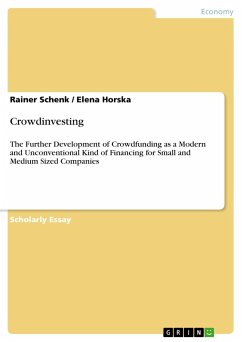Master's Thesis from the year 2002 in the subject Business economics - Marketing, Corporate Communication, CRM, Market Research, Social Media, grade: 1,0, University of Applied Sciences Nuremberg (Betriebswirtschaft), language: English, abstract: Inhaltsangabe:Abstract:
The last decade was characterized by mainly to major developments. The first was the ongoing globalization of the markets. A development that was not absolutely new in the nineties, since it is already progressing since the fifties. But it was in recent years when this development gained such an unprecedented momentum and dynamics, which most people and enterprises were just not prepared for. The second was the emerge of the Internet and the following e-hype about the new economy .
Larry Downes named both in his much considered article Behind Porter as two of three new driving forces and influencing factors for the economic affairs of the new century. And he might probably be right. Although one of them suffered quite a setback at the end of the nineties when the Internet bubble finally busted. But if one looks on the technological developments taking place then there is no doubt, that the Internet will continue its triumphal procession. Certainly in a different way as it did in the last decade. And probably it will not constitute a new economy, but it certainly will extremely change the old one.
The same is true for globalization, although its effects are maybe not that obvious. But the trend towards one global market is obvious. The last event in that respect was probably the Peoples Republic of China entering the World Trade Organization and opening thereby up its markets for foreign enterprises.
Before that background and as policy-makers and business-people look for development paths which might take economies successfully over the next decades, three of the issues which are receiving a lot of attention are:
What is the effect of globalization ?
What is the role of small and medium-sized enterprises?
What is the impact of electronic commerce , the rapidly changing ways in which commercial activities may be undertaken using innovations in information technology?
The small and medium-sized enterprises are building the backbone of the German economy. These companies where responsible for the fast recovery of Germany after Second World War and since them have greatly contributed to develop Germany to the third largest economy in terms of gross national product in the world. Ludwig Erhardt, former German Chancellor and influential Minister of economics, once described the importance of the Mittelstand for the German economy and society in a speech held in Göteburg 50 years ago. And his words retain their full validity even in the beginning of the 21st century.
And now these enterprises probably face their greatest challenge ever: the coping with the afore mentioned developments.
As ice hockey great Wayne Grezky repedently said, that the key to win is to get first where the puck moves next. Compared with today s situation of the small and medium-size enterprises in Germany one can say, that some do not even see the puck, some are just behind it and only a few are really at the game. This assessment might be a little bit exaggerated, but it somehow fits the situation.
It is true, that German small and medium-sized enterprises have caught up quite a bit over the last two years when speaking about the utilization of the Internet and their internationalization efforts. But regarding the Internet, they still use it far beyond its possibilities especially regarding eBusiness and eCommerce. Although utilizing them in a proper way not the way enterprises thought of during the e-hype years -, but rather in a realistic one, this would really help them to better deal with both globalizations and the increased and intensified competition. And speaking about globa...
Hinweis: Dieser Artikel kann nur an eine deutsche Lieferadresse ausgeliefert werden.
The last decade was characterized by mainly to major developments. The first was the ongoing globalization of the markets. A development that was not absolutely new in the nineties, since it is already progressing since the fifties. But it was in recent years when this development gained such an unprecedented momentum and dynamics, which most people and enterprises were just not prepared for. The second was the emerge of the Internet and the following e-hype about the new economy .
Larry Downes named both in his much considered article Behind Porter as two of three new driving forces and influencing factors for the economic affairs of the new century. And he might probably be right. Although one of them suffered quite a setback at the end of the nineties when the Internet bubble finally busted. But if one looks on the technological developments taking place then there is no doubt, that the Internet will continue its triumphal procession. Certainly in a different way as it did in the last decade. And probably it will not constitute a new economy, but it certainly will extremely change the old one.
The same is true for globalization, although its effects are maybe not that obvious. But the trend towards one global market is obvious. The last event in that respect was probably the Peoples Republic of China entering the World Trade Organization and opening thereby up its markets for foreign enterprises.
Before that background and as policy-makers and business-people look for development paths which might take economies successfully over the next decades, three of the issues which are receiving a lot of attention are:
What is the effect of globalization ?
What is the role of small and medium-sized enterprises?
What is the impact of electronic commerce , the rapidly changing ways in which commercial activities may be undertaken using innovations in information technology?
The small and medium-sized enterprises are building the backbone of the German economy. These companies where responsible for the fast recovery of Germany after Second World War and since them have greatly contributed to develop Germany to the third largest economy in terms of gross national product in the world. Ludwig Erhardt, former German Chancellor and influential Minister of economics, once described the importance of the Mittelstand for the German economy and society in a speech held in Göteburg 50 years ago. And his words retain their full validity even in the beginning of the 21st century.
And now these enterprises probably face their greatest challenge ever: the coping with the afore mentioned developments.
As ice hockey great Wayne Grezky repedently said, that the key to win is to get first where the puck moves next. Compared with today s situation of the small and medium-size enterprises in Germany one can say, that some do not even see the puck, some are just behind it and only a few are really at the game. This assessment might be a little bit exaggerated, but it somehow fits the situation.
It is true, that German small and medium-sized enterprises have caught up quite a bit over the last two years when speaking about the utilization of the Internet and their internationalization efforts. But regarding the Internet, they still use it far beyond its possibilities especially regarding eBusiness and eCommerce. Although utilizing them in a proper way not the way enterprises thought of during the e-hype years -, but rather in a realistic one, this would really help them to better deal with both globalizations and the increased and intensified competition. And speaking about globa...
Hinweis: Dieser Artikel kann nur an eine deutsche Lieferadresse ausgeliefert werden.








